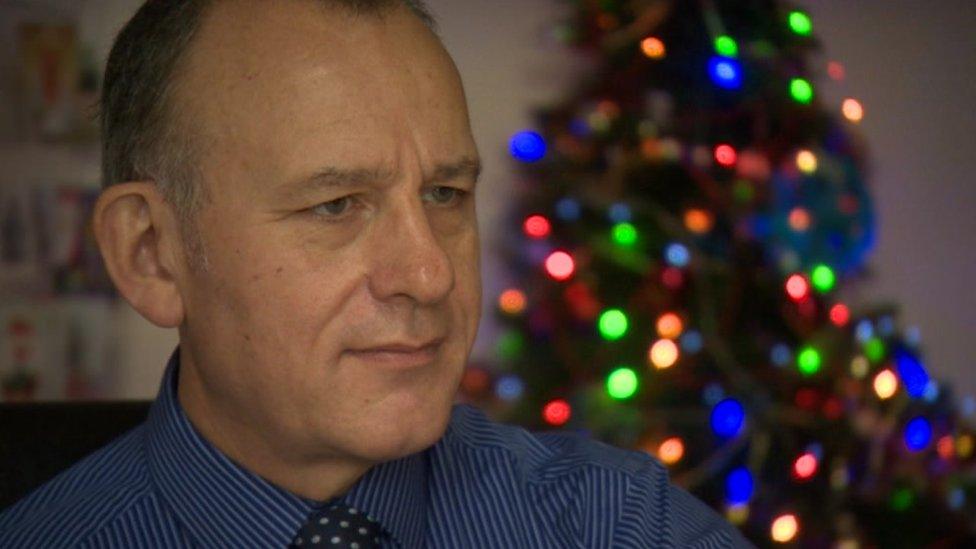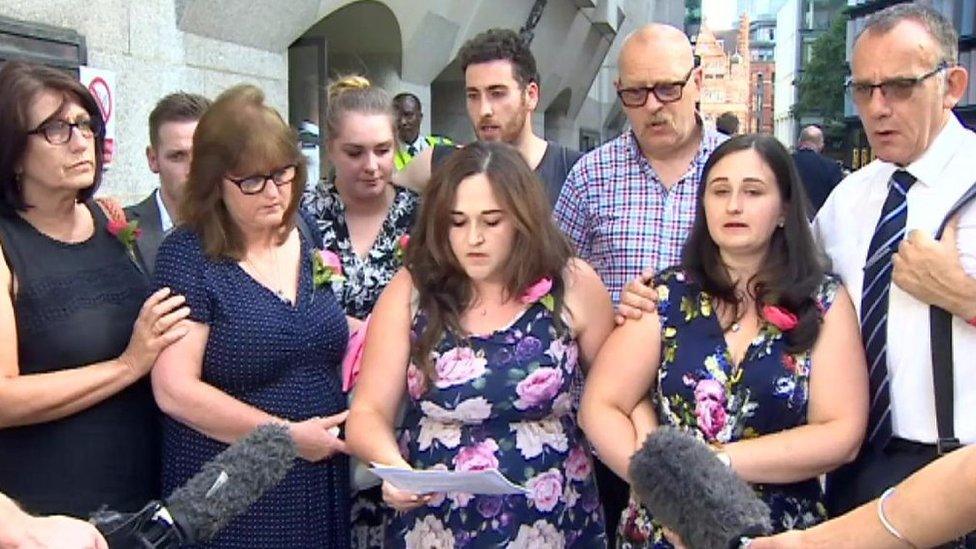Jack Shepherd: Anger over on-the-run speedboat killer
- Published

Charlotte Brown and Shepherd shared two bottles of wine at dinner before the speedboat crash
The family of a woman who died in a speedboat crash on the River Thames have been speaking about their anger that her killer is still on the run.
In July, Jack Shepherd was jailed for six years for the manslaughter of 24-year-old Charlotte Brown in 2015.
However, the trial was held in his absence and he remains at large.
Ms Brown's father Graham Brown has told The Telegraph, external he suspects that police "haven't got a clue" where his daughter's killer is.
"They've posted him missing on Interpol and that's about it," he said.
On Monday, Prime Minister Theresa May's spokesman said the case raised "significant public concerns" and called on Shepherd to hand himself in.

Graham Brown previously told the BBC he was "not convinced the authorities are doing everything possible"
Ms Brown's family have also spoken about their anguish that Shepherd has been given permission to appeal against the conviction, in spite of his disappearance.
Her sister Katie told the BBC the family were "pretty shocked that it's been allowed to happen".
"He's still on the run, he hasn't served a day of his sentence and he's been allowed to still be in communication with his lawyers.
"He's been able to appeal using legal aid as well," she said.
Roz Wickens and Katie Brown said they were "devastated" Jack Shepherd had not faced justice
What did Shepherd do?
Shepherd and Ms Brown, who was from Clacton, Essex, met through the dating website OkCupid.
On their first date in December 2015, they dined in London's Shard skyscraper before the web designer took the 24-year-old out on his speedboat.
In mobile phone footage filmed during the date, Ms Brown could be heard shouting that they were going "so fast" as Shepherd drove at more than double the 12-knot speed limit.
The speeding boat, which Shepherd told police he had bought "to pull women", then hit a submerged log and tipped over, flinging them both into the water.

The web designer was found clinging to the hull but Ms Brown was pulled from the water unconscious and unresponsive and died in hospital.
In July, a jury found Shepherd guilty of manslaughter by gross negligence.
Where did Shepherd go?
He told his lawyers in mid-May he would not be attending his trial at the Old Bailey but the Crown Prosecution Service only found out a week before it began.
During the trial, his defence team said they did not know where he was, although his solicitor had maintained telephone contact with Shepherd.

Jack Shepherd attending a hearing at Wimbledon Magistrates' Court in 2017
Following his conviction, police said they believed Shepherd might have fled abroad but they have said they have "no tangible trace" of him. The last confirmed sighting of him was in March 2018 in Devon, police said.
"There have been a number of rumours that he is being harboured abroad by friends but we have no evidence this is the case," Det Ch Insp Mick Norman said on Monday.
The 31-year-old - who police say has a valid passport - has not been using his known bank accounts or mobile phone, although Mr Norman said he "may well be using the accounts of friends or associates to evade arrest and extradition".
"We would appeal to Mr Shepherd's friends and associates who may be assisting him through a misplaced sense of loyalty to do the right thing and share any information they have with the police," he said.
What do his solicitors say?
Tuckers Solicitors, which is representing Shepherd, said it was "not aware of his whereabouts".
In a statement, the law firm said it had been "instructed to represent Mr Shepherd" and would do so "without prejudice and to the best of our ability".

After the crash Shepherd told police he bought the speedboat "to pull women"
Last month, the Court of Appeal confirmed that a judge had given him permission to appeal against the conviction, although permission to appeal against his six-year jail sentence was refused.
Tuckers said the appeal would be "based on what the defence believe were legal errors made during the trial" and Shepherd's continued absence "has no effect on the principle of an appeal, which is purely based on matters of law".
"Previous case law confirms that an absent defendant still has the right to appeal against legal errors at a trial that took place in his absence," the firm said.
Why is Shepherd entitled to legal aid?
He was eligible for legal aid for his criminal trial and this is automatically extended to advice about his appeal - regardless of whether he is in custody or on the run.
Tuckers have said the fee for representing the 31-year-old amounts to "less than £30,000".
Jack Shepherd told police he never asked if Charlotte Brown could swim
What does the government say?
The prime minister's official spokesman said Theresa May's "strongest sympathies are with the family of Charlotte Brown, and Jack Shepherd should give himself up right away to face justice".
He said she was aware of the "significant public concerns around this case" which was "why the Ministry of Justice is looking into the issues that it raises".
Home Secretary Sajid Javid recently sent a letter to the Brown family in which he told them "no-one is above the law", and that he had "instructed Home Office officials to seek assurances from police".
A meeting has also been arranged between Mr Javid and Ms Brown's family on 22 January to discuss the case.
James Brokenshire, MP for Old Bexley and Sidcup where some of the family live, has also pledged his support for the Browns.
Mr Brokenshire said he wanted to "ensure that all steps and measures are being taken... to bring Shepherd back to the UK so that he faces the justice he rightly deserves".
What happens next?
If Shepherd is apprehended in the UK, he will be taken into custody to start serving his six-year sentence.
Nevertheless, the appeal against his conviction will still go ahead.
A date for the hearing has yet to be set.
- Published26 July 2018

- Published26 July 2018

- Published26 July 2018
